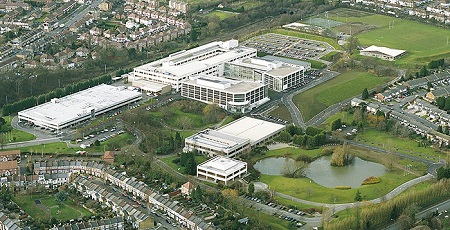North London Business Park is a 16-hectare campus-style office development located in New Southgate, nestled in attractive landscaped grounds with a pretty lake. The park is accessible via Oakleigh Road South or Brunswick Park Road.
Commercial real estate at North London Business Park totals 382,000 square feet and includes a superb portfolio of dedicated office and educational space. Serviced offices are available at the Comer Innovation Centre, and units range from 250 to 80,000 square feet, available on flexible terms, making the park the perfect choice for local businesses and start-ups.
Office space at the North London Business Park is spread over six buildings, although not all currently offer office space:
– Building 3 is a three-storey structure surrounded by 40 acres of parkland that offers Grade A office space as well as serviced offices. Traditional office units are available as whole-floor units or in smaller suites of up to 125,000 square feet.
– Building 4: over 170,000 square feet with on-site security, a cafe, and close to public transportation. The building has open plan office space (sub-divisions considered) and meeting / training space.
– Building 5: a two-storey building complete with auditorium and 140 parking spaces.
– Building 6: the smallest of all buildings at North London Business Park.
Reception is located in Building 2 and there is conferencing and events space available at the Emerald Suite, which is located on the side of the park facing Oakleigh Road. This venue has an approximate capacity of 590 people and has 7 meeting rooms. Continue reading “Everything You Need to Know about the North London Business Park”


 In this day and age, it is no longer simply an option to select the green choice for disposing of our unwanted office furniture and IT equipment; it is a
In this day and age, it is no longer simply an option to select the green choice for disposing of our unwanted office furniture and IT equipment; it is a 

 London tops the list of the 25 best meeting destinations in Europe, hosting hundreds of conferences, congresses, and professional events every year. The city’s venues cater to every industry sector and accommodate meetings of all sizes, from meeting rooms for small gatherings to large venues capable of accommodating thousands of delegates. Among all this choice, we highlight some of the most innovative and unique meeting spaces in London.
London tops the list of the 25 best meeting destinations in Europe, hosting hundreds of conferences, congresses, and professional events every year. The city’s venues cater to every industry sector and accommodate meetings of all sizes, from meeting rooms for small gatherings to large venues capable of accommodating thousands of delegates. Among all this choice, we highlight some of the most innovative and unique meeting spaces in London. Demand For Office Space In London
Demand For Office Space In London The Business Design Centre is located in a Grade II listed building that has a long history, originating in the mid 19th century. Inaugurated under the name of Royal Agricultural Hall, the building was created to host exhibitions and other large events until the mid 1940s.
The Business Design Centre is located in a Grade II listed building that has a long history, originating in the mid 19th century. Inaugurated under the name of Royal Agricultural Hall, the building was created to host exhibitions and other large events until the mid 1940s. Since the creative industries emerged as a distinct sector in the late 1990s, they have been driving economic growth and helping promote employment growth across the UK. Their impact and rise have been so vast that there is now talk of a
Since the creative industries emerged as a distinct sector in the late 1990s, they have been driving economic growth and helping promote employment growth across the UK. Their impact and rise have been so vast that there is now talk of a 